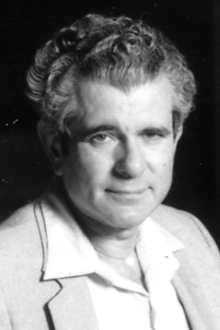Memorial service Monday for Ted Kazanoff, a great act
Longtime head of theater arts helped launch many careers

Members of the Brandeis community will gather Monday to honor professor emeritus Ted Kazanoff, a gifted actor and director who helped launch the careers of Debra Messing ’90, Tony Goldwyn ’82 and many others as the longtime head of the university’s theater arts department. He died on Oct. 21 at the age of 90.
The memorial will be held at 7 p.m. in Spingold Theater, and is expected to draw many former Brandeis students and colleagues from the Boston theater community who were influenced by his teaching style and dedication.
Kazanoff, who retired from Brandeis in 1992, trained a generation of successful actors who work in film, television and theater around the country. Along with Messing and Goldwyn, he also worked with Brandeis alumni Annette Miller ’58, MFA ’76; Eric Engel, MFA ’86; and Mary C. Huntington, MFA ’87.
“Ted was a world-class teacher,” says Engel, artistic director of the Gloucester Stage Company and director of Sanders Theatre and college theater venues in the Office for the Arts at Harvard.
Other former students and colleagues echo that conviction. “I’ve worked with a lot of celebrated teachers over the years, but the singular voice inside my head every day at work — whether on a film set or onstage — is Ted’s,” says Goldwyn, who plays President Fitzgerald Grant in the TV series “Scandal.”
In an interview earlier this year with Hollywood Reporter awards analyst Scott Feinberg ’08, Messing said, “Ted Kazanoff was the one who made me decide to do this for my life.”
His classes could be a punishing exercise in soul-searching self-appraisal and personal risk-taking. A commanding, even intimidating presence (he was 6 feet, 3 inches tall), with a deep, gruff voice, Kazanoff was known for his “razor-sharp focus and often unforgiving candor,” Engel says.
He employed an approach to acting that was simple, clear and uncompromising, drawing on techniques developed by Konstantin Stanislavski, Uta Hagen and Sanford Meisner. “He would use their tools to shake the actor up and get him out of his head,” says Mark Ellmore, MFA ’92.
“With coffee cup in one hand and cigarette in the other, he would bellow, ‘What are you doing?’” remembers Engel. “He meant, ‘What are you doing — as an actor?’ He meant, ‘What is your intention?’ On one such occasion, a nervous actress replied, ‘I am trying not to cry.’ Ted put down his coffee, extinguished his cigarette and approached the student: ‘Now that, that is something we can work with. Trying not to cry, that’s an intention!”
By some accounts, many of Kazanoff’s students dissolved into tears at one point or another under his ferocious style. “He was tough on the outside, tough on his students, tough on himself,” notes Daniel Gidron ’66, MFA ’68, who came back to Brandeis in 1976 as an artist-in-residence and taught in the theater arts department until 1994.
Susan Dibble, the Barbara Sherman ’54 and Malcolm L. Sherman Director of Theater Arts, who overlapped with Kazanoff at Brandeis for five years, puts it this way: “He embodied the power of honest acting, and he carried on the traditional teaching of acting as talking and listening, of being in the moment.”
“Knowing when a scene has gone awry, even knowing why it’s gone awry, is one thing; being able to fix it is something else altogether,” Engel says. “Ted was brilliant at identifying the precise moment where an actor’s intention was lost, or when two actors stopped connecting, or where the most interesting thread of a scene had been discarded. He was just as sharp and skilled at repairing those breakdowns.”
Kazanoff was unflagging in his support of his students beyond graduation — particularly those working in New England. Often, he would attend his former students’ Boston performances — and be immediately recognized in the audience by his large head. After he saw former student Paula Plum appear in “Wit,” Kazanoff sent her a note which she framed congratulating her on her performance. “That was better than winning an Oscar,” says Plum, who this fall is directing the Brandeis production of “The Glass Menagerie.”
“He was dedicated to getting the best out of you,” says Huntington, who is now the artistic director of the Nora Theatre Company in Cambridge, Mass., and whom Kazanoff directed in “The Little Foxes” and “The Mad Woman of Chaillot.”
Kazanoff’s directing credits include productions as varied as Shakespeare, Bertolt Brecht, Lillian Hellman and Harold Pinter. As an actor, he appeared in many theater productions, as well as in episodes of the TV series “Law and Order,” “Brooklyn Bridge” and “American Playhouse.”
Two years before his death, Kazanoff received the Independent Reviewers of New England award for his work in the theater. Miller introduced him at the ceremony. Although he had prepared an acceptance speech, she says, he declined to deliver it at the time, though he sent it to her later.
In it he wrote, “After all, it is that humanity, that love of life and people, that love of the world around, that is what the endeavor is all about, or, at least, it should be.”
Gifts may be made to the Lee and Ted Kazanoff Endowed Scholarship, Brandeis University, Mail Stop 126, P.O. Box 549110, Waltham, MA 02454-9110 or online<givingto.brandeis.edu>.
This story appears in the fall issue of Brandeis Magazine.





